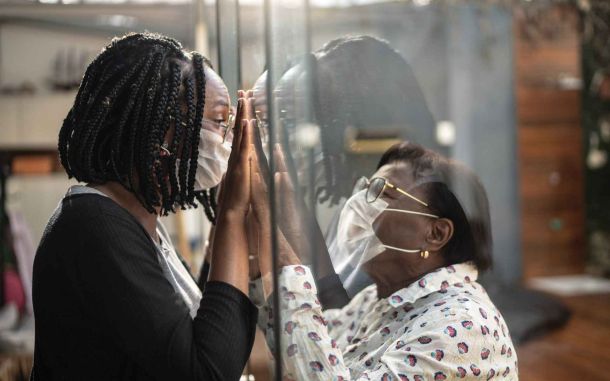The Humanity of Muhammad: Interview with Craig Considine

In This Article
-
The blending of humanity is what Muhammad had envisioned for the Ummah. Diverse groups of people coming together to figure out how to make the “best” of human civilization.
-
Muhammad was a believer in the fundamental connection of human beings first as human beings instead of exclusive categories rooted in ethnicity, race, or religion. His “primary” identity was “human.”
-
Faith in the ability to create a better world is crucial to the well-being of humanity itself.
It was May 2019. We were observing the holy month of Ramadan, and while we were physically in the office and doing our usual work, our stomachs and spirits were on their annual leave. Deprived from my habitual caffeine intake of tea and coffee, my eyes rolled over to social media for some distraction. It was indeed a happy distraction, for I saw another beautiful post from one of favorite accounts. I read the post loudly so my colleagues could hear. “How nice it would be if we published a book by him,” I said. “Is ‘him’ Craig Considine?” asked one of my colleagues; “I just noticed an email from him in our spam box,” he said. He rarely checks the spam box—that day, he was meant to do so. And in that email, Craig was inquiring if we would be interested in publishing his manuscript. It was indeed a serendipitous moment when the first seeds of the book The Humanity of Muhammad: A Christian Perspective were being sown. It was released about a year later. Commercially, it was not the best time because of Covid-19. But we were all very pleased that it was available for mass readership.
The Humanity of Muhammad soon became a bestseller in its category and was later designated as one of best books of all time (in the field of Middle East studies) by www.bookauthority.com. The success of this book prompted Dr. Considine to write another volume: People of the Book: Prophet Muhammad’s Encounters with Christians (published by Hurst).
Around the days when The Humanity of Muhammad was released, George Floyd was brutally killed, leading to mass demonstrations in the United States. Sadly, race-triggered violence is happening all over the globe. There are thousands of people being abused like slaves in many countries. And today, in many places, religious intolerance is no different than it was in seventh century Arabia. Women are still being discriminated against in the workplace, and they continue to suffer domestic violence. At the center of all these problems is the absence of wisdom, of equal opportunities, and of awareness of basic human rights and civic duties. In this book, Dr. Considine engages with the life of Prophet Muhammad, peace be upon him, in consideration of these rights and duties, and explores how he contributed to human civilization in this regard.
We spoke with Dr. Considine about his book and a bit more:
Craig, you are touching the hearts of many believers around the world with your activism promoting understanding between Christians and Muslims. Your book “The Humanity of Muhammad” is great evidence to that. Why the “humanity” of Muhammad?
Because the humanity of Muhammad provides a necessary medicine to cure the world of its many ills. His love of humanity is evident in promoting civic nation building, racial equality, and religious pluralism. These things are needed now more than ever.
What is the message of Prophet Muhammad to you in terms of 1) belief in God; and 2) as a believer in a time when religion is not the most “fashionable” thing in the world?
Muhammad was a believer in the Oneness of Creation, thus, the fundamental connection of human beings first as human beings instead of exclusive categories rooted in ethnicity, race, or religion. His “primary” identity was “human.”
Women continue to be oppressed even today. Religion and clergy are not particularly known for defending women’s rights. But the Prophet Muhammad you portray is in contrast to this general perception. What would you say on that?
Muhammad was not just an advocate of women’s rights; he was a champion of them. He was far, far ahead of his time when it came to the promotion of a current buzz word like “feminism.” The examples are too many too count, but his relationship with Khadija speaks volumes about his views on the rightful place of a woman in a given society.
We know you particularly liked the cover. Why was that? What does the cover represent?
The cover intrigued me because it shows a beautiful blending of colors and textures. The blending of humanity is what Muhammad had envisioned for the Ummah. Diverse groups of people coming together to figure out how to make the “best” of human civilization.
As a Christian who writes positively on Islam, you are not always receiving positive reactions. Muslims want you to become Muslim, and Christians think you are not a good Christian. Does this become unbearable at times?
No, it is never “unbearable,” as I believe wholeheartedly in the “mission” of “being a bridge.” My belief and faith keep me focused and hopeful. Plus, my mom always told me, “You cannot please everyone!”
The first question Krista Tippett asks her guests in her show On Being is about their earliest memories of faith in childhood. What is your earliest memory of faith?
My earliest memory of “true faith” is watching Angelina Tedesco (ni Alonzo), my Italian “Nana” (grandmother), praying the Rosary on her rocking chair in Newton, Massachusetts while I was sitting on the ground right next to her. I was trying to get her attention; Nana did not even flinch when I tried to talk to her. She was “locked into” her prayers.
We are living in a time when many historians and futurists look into a future when AI will dominate the world, so much so that humanity as we know will not survive. What is your projection of life?
My projection on “life” itself is that human civilizations need to look beyond our world for other spaces to live and hopefully thrive. As for the influence of AI, I do not think it will ever get to the point of iRobot, the movie starring Will Smith, but I suppose it is also possible.
What is the purpose of life? Is there a purpose? What is your purpose in life? What is it that makes you wake up every morning?
Jim Valvano, the Italian American college basketball coach, said it best in his well-known ESPY speech during his battle with cancer. He said that we should do three things every single day of our lives: laugh, think (spending time in thought), and cry (being moved to tears by joy or happiness). In summary, a “life of purpose” seeks to love and to do good, to be kind and hospitable, and to love one another as we would want to be loved ourselves.
What does faith offer to humanity? Why do we need to believe?
Faith in the ability to create a better world is crucial to the well-being of humanity itself. Faith provides optimism for a better future. Without faith, life becomes stagnant. If we do not have faith in ourselves, we cannot have faith in others, which contributes to social incohesion. We want to avoid that at all costs.
Who is God in your eyes? The Watchmaker? Or the One Who is actively involved in all affairs?
To be honest, I am unsure about who or what exactly “God” is or is not. I do believe in a “force” that created everything. Outside of that, I turn to Socrates, who humbly said, “I know that I do not know.” I like to keep it humble.









